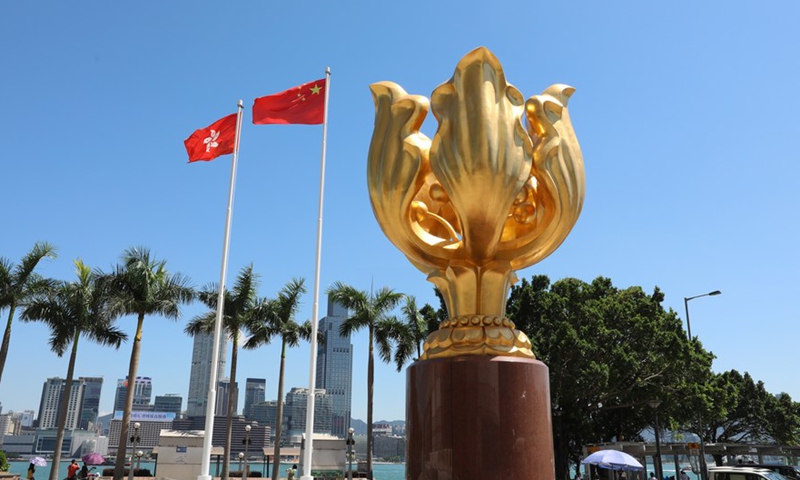Upcoming national security law won't affect HK's judiciary independence: former Secretary for Justice
By Bai Yunyi Source:Globaltimes.cn Published: 2020/6/22 2:34:41

Photo taken on Aug. 5, 2019 shows China's national flag and the flag of the Hong Kong Special Administrative Region (SAR) on the Golden Bauhinia Square in Hong Kong, South China. Photo:Xinhua
The central government commissioner's office in Hong Kong and other relevant national security agencies will exercise jurisdiction over some very specific and very few cases that endanger national security, such as treason or secessionism, the former Secretary for Justice told the Global Times on Sunday.
Under British colonial rule, if Hong Kong governors committed a crime, they would be sent back to Britain to face prosecution, said Elsie Leung Oi-sie, deputy director of Hong Kong Basic Law Committee of the Standing Committee of the National People's Congress and former Secretary of Justice.
As an example judicial jurisdiction challenges around the world, Leung pointed to Spain's jurisdiction over its autonomous region of Catalonia, when secessionist leaders from the region were tried in the country's supreme court in Madrid.
When it comes to cases involving "Tibet independence " and "Xinjiang independence," central authorities need to step in and handle these situations. Hong Kong law enforcement agencies have no experiences in dealing with these types of cases, the former official said.
"Of course the meaning of 'specific circumstances' and 'very few cases,' depends on the detailed provisions in the law," she said.
The draft of the national security law for Hong Kong clearly stipulates case jurisdiction, law application and related procedures. The Hong Kong Special Administrative Region (HKSAR) shall exercise jurisdiction over criminal cases endangering national security including investigation, prosecution and punishment, unless there are special circumstances, according to the draft.
All these procedures would be carried out under the legal system of the HKSAR, in line with local laws and the national security law for Hong Kong, the draft said.
The chief executive of the HKSAR government shall appoint a number of judges who would be responsible for handling crimes that endanger national security, the draft states.
Faced with rising concerns over the administration's interference in the legal system, the former Secretary for Justice said it is unlikely a judge will be appointed for each case, but judges could be chosen from a list who would then be engaged in prosecuting national security-related crimes.
"It should be clearly stated that the judges in the HKSAR are indeed appointed by the chief executive," Leung said, noting that judges presiding over district and high courts, are appointed by the chief executive through the Judicial Officers Recommendation Commission.
While chief executives have power to appoint judges they cannot intervene in a trial, Leung said. The firing of judges is also determined by a disciplinary committee composed of three judges, rather than the chief executive, to ensure a dismissal isn't made because the chief executive is dissatisfied with a judge's legal ruling.
In response to a question on whether setting the commissioner's office for national security affairs in the HKSAR is the central government's effort to "squeeze" the "one country, two systems" principle, Leung said the responsibilities and tasks of the office are clearly stated in the draft law.
"The HKSAR government has been dealing with public security issues for a long time, but it lacks experience in handling national security affairs and an appropriate law enforcement mechanism. This is a weak spot," she said.
The draft also stipulates that in addition to observing national laws, the staff of the office shall also observe the laws of the HKSAR and shall not infringe upon the legitimate rights and interests of any individual or organization. In addition, an agency dispatched by the central government will be supervised and held accountable by the central government.
For the past 23 years, the People's Liberation Army garrison in Hong Kong has been abiding by the Garrison Law and the laws of the HKSAR without incident or accident.
According to the draft of the national security law, the HKSAR will set up a national security committee, which will assume the main responsibility for safeguarding national security. Some pro-democracy legislators and legal professionals in Hong Kong have claimed that the committee is "too powerful" and could interfere with prosecutions and judiciary, affecting the independence of the region's judiciary.
Leung denied this would happen. Cases related to national security will be dealt with by a national security crimes department under the Department of Justice of the HKSAR, the same way other crimes are prosecuted in Hong Kong. All of which are free from outside interference.
As for the national security enforcement division under the Hong Kong Police Force, surveillance of communications or door-to-door searches during the investigation of serious crimes require prior approval and are carried out in strict accordance with the law. There is no possibility the national security law will give a body "too much power" or "affect the independence of the judiciary," she said.
Posted in: HK/MACAO/TAIWAN